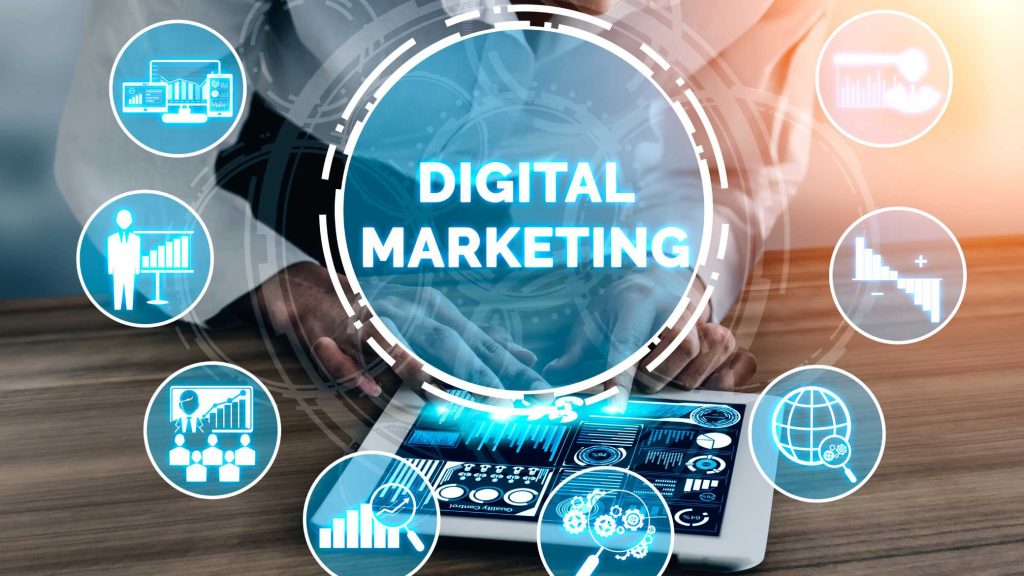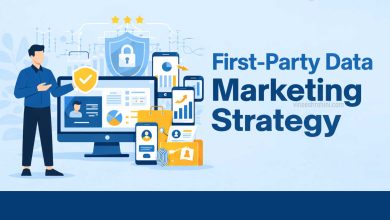The Role of Digital Marketing in Fintech Growth : Comprehensive Guide 2025
The Role of Digital Marketing: The financial technology (fintech) industry has been revolutionizing the way people interact with financial services, offering innovative solutions that are faster, more accessible, and user-friendly. As this industry grows exponentially, digital marketing plays an indispensable role in driving fintech companies toward success. In 2025, where competition is fiercer than ever, a robust digital marketing strategy is not just an option—it’s a necessity.
Table of Contents
This comprehensive guide explores the pivotal role of digital marketing in fintech growth, covering strategies, challenges, and emerging trends shaping the industry.
Understanding Fintech and Its Challenges

Fintech refers to the integration of technology in financial services, enabling users to perform tasks such as payments, lending, investing, and wealth management through digital platforms. Despite its rapid growth, the industry faces several challenges:
- High Competition: The market is saturated with numerous players, from startups to established financial institutions, all vying for customer attention.
- Customer Trust: Convincing customers to trust a relatively new brand with their finances is a significant hurdle.
- Regulatory Compliance: Fintech companies must navigate a complex landscape of regulations, which can vary across regions.
- User Engagement: Keeping customers engaged and loyal in a crowded market requires innovative approaches.
Digital marketing emerges as a powerful tool to address these challenges, offering fintech companies the ability to connect with their audience, build trust, and stand out in the marketplace.
Read more: The Basics of Digital Marketing: Comprehensive Guide 2025
The Core Pillars of Digital Marketing in Fintech Growth
- Building Brand Awareness
- Digital marketing helps fintech companies establish a strong online presence, making their brand recognizable and memorable.
- Strategies:
- Content Marketing: Publishing blogs, eBooks, videos, and infographics to educate and engage the audience.
- Social Media Marketing: Leveraging platforms like LinkedIn, Instagram, and Twitter to reach target demographics.
- Search Engine Optimization (SEO): Ranking higher on search engines ensures greater visibility.
- Enhancing Customer Trust
- Trust is critical in fintech, where users entrust companies with sensitive financial data. Digital marketing helps foster credibility through transparency and communication.
- Strategies:
- Customer Testimonials and Reviews: Showcasing real customer experiences builds authenticity.
- Case Studies: Highlighting success stories to demonstrate reliability.
- Engaging Content: Creating informative and transparent content that explains how the platform works, its security features, and benefits.
- Driving Customer Acquisition
- Digital marketing enables fintech companies to target potential customers precisely based on their interests, behavior, and demographics.
- Strategies:
- Pay-Per-Click (PPC) Advertising: Running targeted ads on Google and social media platforms.
- Influencer Partnerships: Collaborating with industry influencers to promote services.
- Affiliate Marketing: Partnering with affiliates who drive traffic and sales.
- Boosting Customer Retention
- Retaining customers is as important as acquiring new ones. Digital marketing ensures consistent engagement and satisfaction.
- Strategies:
- Email Marketing: Sending personalized updates, offers, and newsletters.
- Loyalty Programs: Rewarding repeat customers to build long-term relationships.
- Feedback Loops: Collecting and acting on customer feedback to improve services.
- Leveraging Data-Driven Insights
- Fintech companies thrive on data, and digital marketing provides invaluable analytics to refine strategies and improve outcomes.
- Strategies:
- Behavioral Analytics: Understanding user behavior to offer personalized experiences.
- A/B Testing: Testing different marketing approaches to determine what works best.
- Performance Tracking: Monitoring KPIs like website traffic, conversion rates, and ROI.
Emerging Trends in Digital Marketing for Fintech

As we move into 2025, several trends are shaping the digital marketing landscape for fintech:
- Personalization
- Customers expect tailored experiences, and fintech companies are leveraging AI and machine learning to deliver hyper-personalized content and recommendations.
- Video Marketing
- Video content continues to dominate, with platforms like YouTube and TikTok offering new ways to connect with audiences. Explainer videos, tutorials, and live streams are particularly effective for fintech.
- Voice Search Optimization
- With the growing popularity of voice assistants like Alexa and Siri, optimizing content for voice search is becoming crucial.
- Interactive Content
- Quizzes, polls, calculators, and gamified experiences engage users and make financial services more approachable.
- Sustainability and Ethical Marketing
- Highlighting sustainability efforts and ethical practices resonates with socially conscious consumers.
- Omnichannel Marketing
- Delivering a seamless experience across multiple channels—websites, apps, social media, and email—ensures consistent engagement.
Buy now: Professional Digital Marketing Course
Key Digital Marketing Channels for Fintech
- Social Media Platforms
- LinkedIn: Ideal for B2B fintech companies targeting professionals and decision-makers.
- Instagram and TikTok: Great for visually showcasing products and connecting with younger audiences.
- Twitter: Effective for sharing updates, news, and engaging in industry conversations.
- Search Engines
- SEO and PPC advertising ensure your fintech company appears in relevant search results, driving organic and paid traffic.
- Content Platforms
- Blogs, podcasts, and YouTube channels provide opportunities to educate, inform, and entertain your audience while subtly promoting your services.
- Email Marketing
- Email campaigns are a cost-effective way to nurture leads, update existing customers, and drive conversions.
- Affiliate and Influencer Marketing
- Collaborating with trusted affiliates and influencers can amplify your brand’s reach and credibility.
Challenges of Digital Marketing in Fintech

- Regulatory Restrictions
- Fintech companies must navigate stringent advertising guidelines, particularly in financial promotions.
- Customer Skepticism
- Overcoming distrust and skepticism requires consistent efforts in transparency and communication.
- High Competition
- Standing out in a crowded market demands innovative and creative marketing strategies.
- Ad Fatigue
- Customers are bombarded with ads daily, making it essential to create non-intrusive, valuable content.
Buy now: Professional Digital Marketing Course
Conclusion
Digital marketing is a cornerstone of fintech growth in 2025, enabling companies to build brand awareness, gain customer trust, and drive engagement in an increasingly competitive landscape. By leveraging tools like SEO, social media, email marketing, and personalized content, fintech businesses can position themselves as industry leaders. Furthermore, staying ahead of emerging trends and embracing innovation will ensure sustained success.
As fintech continues to evolve, so will the digital marketing strategies that drive its growth. Companies that prioritize customer-centric, data-driven approaches while adapting to new trends will thrive in this dynamic and fast-paced industry.
Keyword: The Role of Digital marketing



